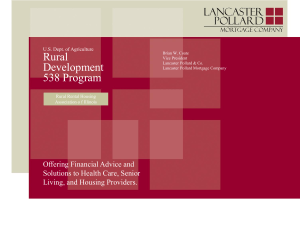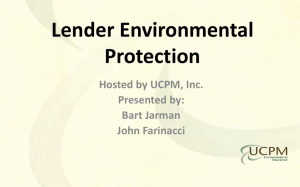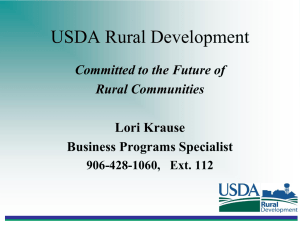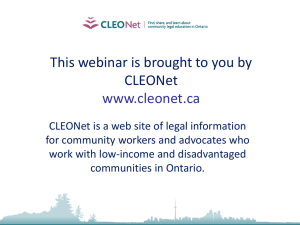ETHICS IN FINANCIAL AID WFAA SUMMER TRAINING, 2013
advertisement
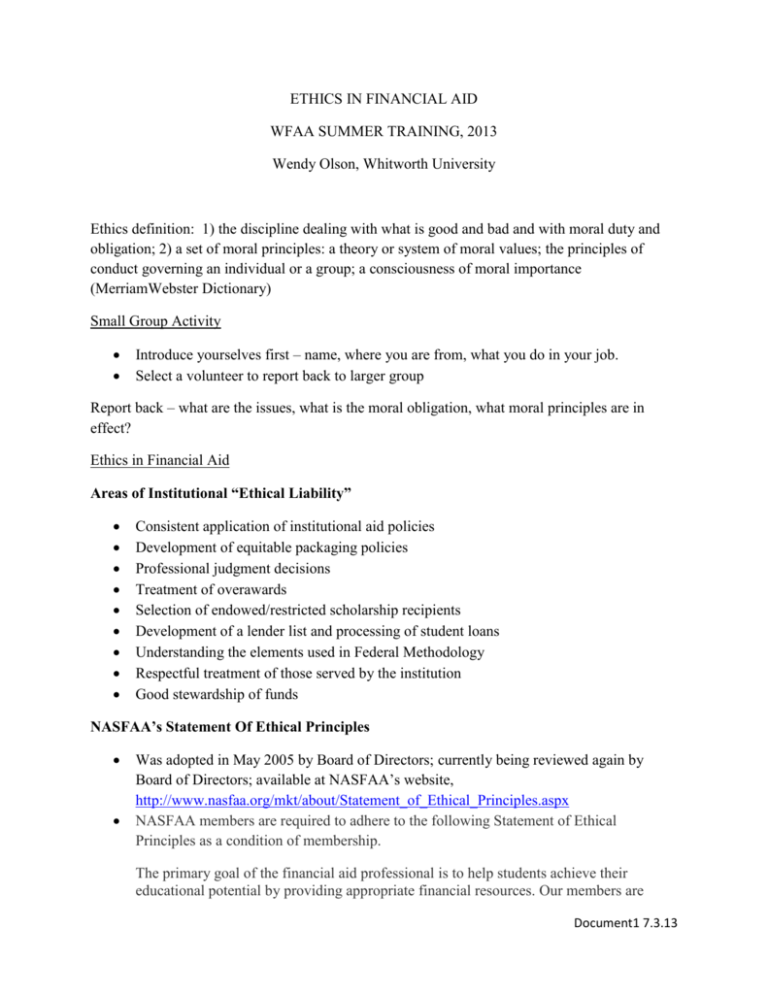
ETHICS IN FINANCIAL AID WFAA SUMMER TRAINING, 2013 Wendy Olson, Whitworth University Ethics definition: 1) the discipline dealing with what is good and bad and with moral duty and obligation; 2) a set of moral principles: a theory or system of moral values; the principles of conduct governing an individual or a group; a consciousness of moral importance (MerriamWebster Dictionary) Small Group Activity Introduce yourselves first – name, where you are from, what you do in your job. Select a volunteer to report back to larger group Report back – what are the issues, what is the moral obligation, what moral principles are in effect? Ethics in Financial Aid Areas of Institutional “Ethical Liability” Consistent application of institutional aid policies Development of equitable packaging policies Professional judgment decisions Treatment of overawards Selection of endowed/restricted scholarship recipients Development of a lender list and processing of student loans Understanding the elements used in Federal Methodology Respectful treatment of those served by the institution Good stewardship of funds NASFAA’s Statement Of Ethical Principles Was adopted in May 2005 by Board of Directors; currently being reviewed again by Board of Directors; available at NASFAA’s website, http://www.nasfaa.org/mkt/about/Statement_of_Ethical_Principles.aspx NASFAA members are required to adhere to the following Statement of Ethical Principles as a condition of membership. The primary goal of the financial aid professional is to help students achieve their educational potential by providing appropriate financial resources. Our members are Document1 7.3.13 required to exemplify the highest level of ethical behavior in helping students and families find the best ways to pay for college and demonstrate the highest level of professionalism. We take great pride in our essential task of helping our students and families determine the best ways to meet their educational expenses. The Financial Aid Professional shall: 1. Be committed to removing financial barriers for those who wish to pursue postsecondary learning. 2. Make every effort to assist students with financial need. 3. Be aware of the issues affecting students and advocate their interests at the institutional, state, and federal levels. 4. Support efforts to encourage students, as early as the elementary grades, to aspire to and plan for education beyond high school. 5. Educate students and families through quality consumer information. 6. Respect the dignity and protect the privacy of students, and ensure the confidentiality of student records and personal circumstances. 7. Ensure equity by applying all need analysis formulas consistently across the institution's full population of student financial aid applicants. 8. Provide services that do not discriminate on the basis of race, gender, ethnicity, sexual orientation, religion, disability, age, or economic status. 9. Recognize the need for professional development and continuing education opportunities. 10. Promote the free expression of ideas and opinions, and foster respect for diverse viewpoints within the profession. 11. Commit to the highest level of ethical behavior and refrain from conflict of interest or the perception thereof. 12. Maintain the highest level of professionalism, reflecting a commitment to the goals of the National Association of Student Financial Aid Administrators. NASFAA’s Code of Conduct In consideration of the complexity of the tasks confronting institutional financial aid professionals, the NASFAA Board of Directors has promulgated this Code of Conduct to provide further guidance respecting the Statement of Ethical Principles. The Code is intended to help guide financial aid professionals in carrying out these obligations, particularly with regard to ensuring transparency in the administration of the student financial aid programs, and to avoid the harm that may arise from actual, potential, or perceived conflicts of interest. Whitworth’s Financial Aid Offices Code of Conduct Based on DCL GEN-08-12 The HEOA adds to the PPA a requirement that an institution participating in a Title IV loan program must develop, publish, administer, and enforce a code of conduct. Whitworth University adheres to this code of conduct as it applies to the officers, employees, and agents of the institution: • a ban on revenue-sharing arrangements with any lender. Document1 7.3.13 • a ban on employees of the financial aid office receiving gifts from a lender, guaranty agency or loan servicer. • a ban on contracting arrangements. • a prohibition against steering borrowers to particular lenders or delaying loan certifications. • a prohibition on offers of funds for private loans. • a ban on staffing assistance. • a ban on advisory board compensation. Ethics in the Workplace Conflict of Interest What is it School’s own code of conduct Financial aid office’s concerns – friends, family members; policy to handle Workplace Ethics for Employees (from Buzzle.com) Commitment Towards Work Loyalty Towards Organization Compassion Towards Coworkers Workplace Ethics for Employers (from Buzzle.com) Transparency While Hiring Equality Towards All Employees Humane Behavior Towards Employees Work Ethic Guidelines Developed by LSU AgCenter, Now at this address: http://www.uwyo.edu/4-h/charactercounts/intro-work-ethic-guidelines.pdf o Trustworthiness o Respect o Responsibility o Fairness o Caring o Citizenship From Buzzle.com o Honesty o Respect o Professionalism-includes thoroughness, punctuality, accountability, dedication, integrity o Setting Boundaries-keep business away from what strictly speaking is not your business Ethical Concerns Red Flags In yourself In others Document1 7.3.13 How to Manage Ethics in the Workplace (from ehow.com) Communicate the company’s ethics policy clearly Make it easy for employees to seek guidance when they need help making a decision a decision. Create an atmosphere in which employees can trust their supervisors and know they can report violators of the ethics policy. Set an example. Ethical/Moral Dilemmas What are they? Ethical or moral dilemmas occur when a person has the ability to make two choices, but can only perform one or the other, according to Stanford’s Encyclopedia of Philosophy. Types of Ethical Dilemmas Making sacrifices for the greatest good Values and consequences Paternalism versus liberty Moral relativism – in one culture the behavior may be fine, in another abhorrent Solving Ethical Dilemmas--Ethical Decision Making o Consequentialist approach – weighing the possible outcomes and choosing the most beneficial outcome o Deontological approach – weighing each decision based on its righteousness Parting Thoughts You have to be able to sleep at night Know in your gut that you are doing the right thing Be able to live with the consequences Don’t burn bridges Document1 7.3.13 APPENDICES Whitworth’s Code of Conduct Based on Dear Colleague Letter GEN-08-12 The HEOA adds to the PPA a requirement that an institution participating in a Title IV loan program must develop, publish, administer, and enforce a code of conduct. Whitworth University adheres to this code of conduct as it applies to the officers, employees, and agents of the institution: • a ban on revenue-sharing arrangements with any lender. Note: The HEOA defines “revenue-sharing arrangement” as any arrangement between an institution and a lender under which the lender makes Title IV loans to students attending the institution (or to the families of those students), the institution recommends the lender or the loan products of the lender and, in exchange, the lender pays a fee or provides other material benefits, including revenue or profit-sharing, to the institution or to its officers, employees, or agents; • a ban on employees of the financial aid office receiving gifts from a lender, guaranty agency or loan servicer. Note: No officer or employee of an institution’s financial aid office (or an employee or agent who otherwise has responsibilities with respect to educational loans) may solicit or accept any gift from a lender, guarantor, or servicer of education loans. A “gift” is defined as any gratuity, favor, discount, entertainment, hospitality, loan, or other item having monetary value of more than a de minimus amount. However, a gift does not include (1) a brochure, workshop, or training using standard materials relating to a loan, default aversion, or financial literacy, such as a brochure, workshop or training; (2) food, training, or informational material provided as part of a training session designed to improve the service of a lender, guarantor, or servicer if the training contributes to the professional development of the institution’s officer, employee or agent; (3) favorable terms and benefits on an education loan provided to a student employed by the institution if those terms and benefits are comparable to those provided to all students at the institution; (4) entrance and exit counseling as long as the institution’s staff are in control of the counseling and the counseling does not promote the services of a specific lender; (5) philanthropic contributions from a lender, guarantor, or servicer that are unrelated to education loans or any contribution that is not made in exchange for advantage related to education loans, and; (6) State education grants, scholarships, or financial aid funds administered by or on behalf of a State; • a ban on contracting arrangements. Note: No officer or employee of an institution’s financial aid office (or employee or agent who otherwise has responsibilities with respect to education loans) may accept from a lender, or an affiliate of any lender, any fee, payment, or other financial benefit as compensation for any type of consulting arrangement or contract to provide services to or on behalf of a lender relating to education loans; • a prohibition against steering borrowers to particular lenders or delaying loan certifications. Note: For any first-time borrower, an institution may not assign, through the award packaging or other methods, the borrower’s loan to a particular lender. In addition, the institution may not refuse to certify, Document1 7.3.13 or delay the certification, of any loan based on the borrower’s selection of a particular lender or guaranty agency; • a prohibition on offers of funds for private loans. Note: An institution may not request or accept from any lender any offer of funds for private loans, including funds for an opportunity pool loan, to students in exchange for providing concessions or promises to the lender for a specific number of Title IV loans made, insured, or guaranteed, a specified loan volume, or a preferred lender arrangement. An “opportunity pool loan” is defined as a private education loan made by a lender to a student (or the student’s family) that involves a payment by the institution to the lender for extending credit to the student; • a ban on staffing assistance. Note: An institution may not request or accept from any lender any assistance with call center staffing or financial aid office staffing, except that a lender may provide professional development training, educational counseling materials (as long as the materials identify the lender that assisted in preparing the materials), or staffing services on a short-term, nonrecurring basis during emergencies or disasters; and • a ban on advisory board compensation. Note:An employee of an institution’s financial aid office (or employee who otherwise has responsibilities with respect to education loans or financial aid) who serves on an advisory board, commission, or group established by a lender or guarantor (or a group of lenders or guarantors) is prohibited from receiving anything of value from the lender, guarantor, or group, except for reimbursement for reasonable expenses incurred by the employee for serving on the board. Document1 7.3.13 WORK ETHIC GUIDELINES (From LSU AgCenter) TRUSTWORTHINESS Work scheduled hours. Provide honest feedback on progress and problems. Work with little supervision. Give proper notice of anticipated absences. Keep confidences; never reveal proprietary information, and honor a person’s right to privacy. Be honest, reliable and ethical in all business dealings. Refuse to steal, misuse or abuse company time, property or equipment. Refuse to lie, cheat, deceive, manipulate, exploit or take advantage of others. Build confidence between employer, employees, vendors and customers. RESPECT Treat supervisors, co-workers, vendors and customers with courtesy, honor and respect. Build mutual respect and long-term relationships by listening to and communicating openly with others within the workplace and with customers. Be friendly and cooperative. Value and honor all people; follow the Golden Rule. Have an open mind and act justly by listening to and acknowledging the opinions and differences of others. Work as a team member. Be open to and accept instruction or correction. Accept instruction and modify behavior when necessary. Respect the dignity, privacy and freedom of all. Submit to the authority of a supervisor and to workplace rules. Use good manners; be courteous and polite. RESPONSIBILITY Take pride in work--show initiative, recognize what needs to be done, pay attention to detail, pursue excellence and be prepared. Be loyal in attendance and always punctual. Follow instructions. Strive to improve abilities, learn new skills and take on broader responsibilities. Assert personal views in a reasonable manner. Be accountable for the services and products provided; fulfill commitments. Persevere and get the job done. Manage time and resources wisely. Don’t promise more than you can provide to internal or external customers. Set realistic goals and strive diligently to achieve them. FAIRNESS Understand and respect the customer-supplier relationship that exists between the employer, employees, vendors and customers. Make decisions based on facts and strive for win-win situations - consider all stakeholders and the possible short-term and long-term consequences of a decision. Promote and model a positive attitude. Document1 7.3.13 (Over) Be free of bias–open-minded, just, without favoritism or prejudice; listen to and respect the opinions and differences in others. Be willing to negotiate and exercise give and take to achieve group success. Use tact and courtesy. Use only your share of available resources and equipment. Share knowledge, ideas and skills with others. Be flexible regarding diverse expectations, situations and leadership styles. Establish policies in a manner that will not encourage employee dishonesty in reporting expenses, time and absences. CARING Understand and strive for harmonious, mutually beneficial, ethical business relationships between employer, employees, vendors and customers. Demonstrate a positive attitude. Show kindness and sensitivity to the feelings of others. Express gratitude. Take time to help others. Do quality work and attend to details. Be a team player. Take time to talk to people face-to-face about issues. Evaluate work performance accurately. Demonstrate confidence without arrogance. Show a personal concern for fellow employees, customers and vendors. CITIZENSHIP Show initiative by being a helpful, resourceful, cooperative and supportive team player. Demonstrate a positive and enthusiastic work attitude. Understand and contribute to the organization. Follow company policies, regulations and procedures. Ensure compliance with regulations. Accurately report hours worked and expenses incurred. Take care of equipment and resources. Demonstrate interest in ethical, political, economical and environmental issues that affect the company, your career, your community and our nation. Maintain an active role in school and community activities. Pursue life-long learning. Volunteer without expectation of recognition or reward when help is needed. Be a role model and a mentor to new employees. Consider the effect of workplace activities on the environment. Document1 7.3.13

